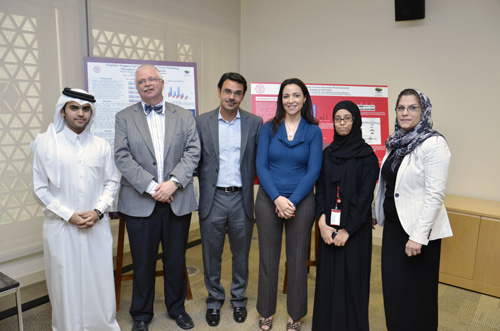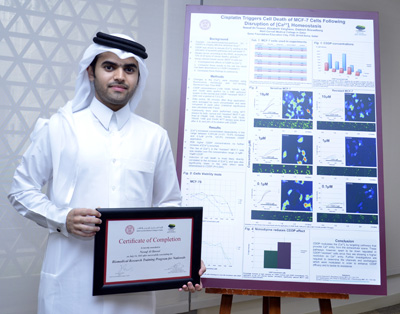Success as we celebrate the first graduates of the Biomedical Research Training Program for Qatari Nationals

Faculty and Grads: (left to right) Nawaf Al-Taweel, Dr. Dietrich
Büsselberg, Dr. Khaled Machaca, Dr. Cindy McKeon,
Kawthar Al-Dabhani, Dr. Nasrin Mesaeli
WCMC-Q celebrate the graduation of these two outstanding students who have just completed our first ever Biomedical Research Training Program for Qatari Nationals.
Kawthar Al-Dabhani, who graduated in Biochemistry from Buffalo University NY and Nawaf Al-Taweel, a pharmacology graduate from Leeds University in the UK, will go on to pursue careers in the challenging field of Biomedical Research.
Open to Qatari Nationals who are college graduates with degrees in disciplines related to science, the program gives a unique opportunity to gain hands on experience in world class research labs that produce results published worldwide in peer reviewed journals.
The program is fully funded by WCMC-Q as an extension to the Qatar Science Leadership Program established by the Research Division at Qatar Foundation, which aims to produce world class Qatari scientists to lead the research centers of excellence that are at the very heart of Qatar’s vision for its future.

Nawaf Al-Taweel completed the Biomedical Research
Training Program for Qatari Nationals
The research project Kawthar worked on focused on the role of calreticulin, a protein that is critical for protein folding and Ca2+ homeostasis in cells. “I am really happy to have completed this program,”. “It gave me hands on experience of what it’s like working on real biomedical research projects. This has been invaluable in helping me decide how best to progress my career,” said Kawthar.
Nawaf looked at the effects of an anti-cancer drug, Cisplatin, on cell death and how to overcome the cells resistance to being treated by Cisplatin. “The research was fascinating and very rewarding to be a part of,” says Nawaf. “Part of our work focused on how tumor cell death occurs, not only through DNA damage caused by Cisplatin, but also via higher levels of calcium in the cells. Our research showed Cisplatin resistant cells have a higher restriction in calcium entry.”
In other words, cancer cells that are resistant to Cisplatin have a higher resistance to calcium entry. These findings, although not unique to this lab, are important as those who undergo cancer treatment with Cisplatin are not able to simply increase dosage as cells become resistant to the drug due the toxic side effects. Therefore decreasing cells resistance to the drug enhances prognosis and outcomes for patients.
Having completed the training program both students plan to further their education. Kawthar intends to take part in a Qatar Science Leadership Program (QSLP) Internship Program with a view to becoming a lab manager whilst Nawaf has applied to Weill Cornell in New York to do a PhD in Molecular Biology.
“The overall aim is to return to Qatar and work within areas of major national concern to us such as in obesity and diabetes research.” He says.
All at WCMC-Q are very proud, not only to have been part of these students’ accomplishments, but also of what they aspire to become. If you are interested in cutting edge research that could help enhance the health of the nation whilst learning in state of the art facilities please contact the research department at WCMC-Q here.
Explore a career in biomedical research either as a bench scientist, a clinician, or a research administrator.
- Work full-time on projects in the research department at WCMC-Q, focusing on stem cells, cell biology, genomics, proteomics, and more.
- Participate in training modules related to communication, ethical compliance, health and safety, and research administration.
- Participants selected for the program will receive a stipend and other benefits including health insurance.
- For more information about the Research Department at WCMC-Q, go to: http://qatar-weill.cornell.edu/research/index.html
